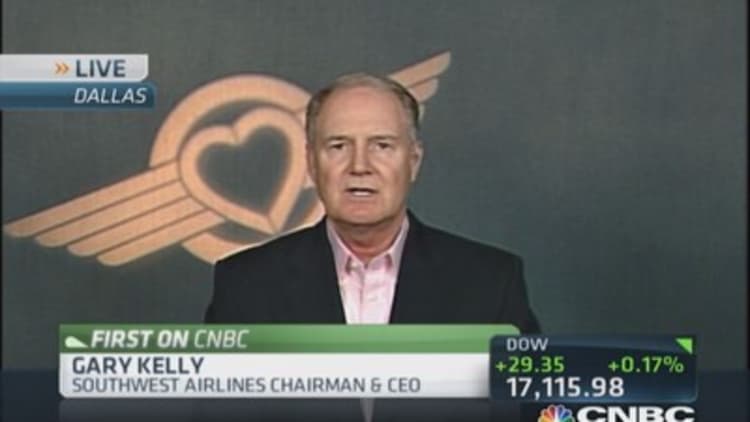For white-knuckle fliers, the air disasters in the past week alone are enough to make them swear off flying forever.
More travelers have perished in plane crashes over the past week than did during all of 2013. Despite that, air travel remains one of the safest forms of travel, so there's little reason for consumers to ground their trips, experts say.
So far this year, 11 incidents have resulted in 644 fatalities, according to Aviation Safety Network data on flights carrying more than 14 passengers. Chief among them is last week's Malaysia Airlines MH17 crash, which killed 298 people. On Wednesday, 47 travelers died when TransAsia Airways flight 222 crashed.
That tally makes 2014 the deadliest year since 2010, when there were 32 crashes resulting in 943 casualties, and well above the 10-year average of 376 fatalities. (Figures do not include Air Algerie #AH5017, which went missing Thursday with 110 passengers and six crew.)
Read More

For an already anxious flier like Allyse Sanchez, hearing about each recent incident adds to the unease. "It always just kind of sits in the back of your mind," said the 25-year-old Denver resident. Sanchez said she had a panic attack on a flight Wednesday to Seattle for business, after a friend texted her shortly before takeoff to tell her about the TransAsia crash. "By the time I got off the plane, I was still shaking," she said. "Knowing I have to get back on a plane again today, it already makes me very nervous."
But despite 2014's high casualty totals, there isn't a pattern in the recent incidents that shows a safety issue in common for travelers to worry about, said Harro Ranter, president of Aviation Safety Network. "When we look at the number of fatal accidents that we've had this year, there's no apparent reason for concern," he said. "Especially the last couple of years, both in terms of the number of accidents and the number of fatalities, were among the safest in airline history."
On "Squawk on the Street" Thursday, Southwest Airlines chairman and CEO Gary Kelly downplayed concerns. "I think we're all very aware of risk around the world in our industry," he said. Air travel is already the safest mode of travel, he said, and the industry is working to make it safer. "We'll continue to keep safety of customers and our crew as our absolute top priority, and look for every opportunity to mitigate risk."
Read More Air travel still safe, says Southwest CEO
If there is a dip in air travel demand from nervous fliers, it's likely to be both slight and short-lived, said David Fuscus, chief executive of consulting firm Xenophon Strategies. "Consumers know, especially in the U.S., that it's very safe to fly," he said.
By the numbers, travelers face long odds on being in a fatal crash. Flying on one of the world's major airlines, on any single flight, you have a 1 in 4.7 million chance of being killed, according to PlaneCrashInfo.com, which tracked accident data from 1993 to 2012. Even if you're flying on one of those with the worst safety records, your odds are still 1 in 2 million.
Over a lifetime, the chance of dying in an "air and space transport incident," as the National Safety Council describes it, are 1 in 8,357. To put that in perspective, by their data from 2010, you're more likely to die from other less-expected causes including heat exposure (1:8,321), choking (1:3,649), in an accident as a pedestrian (1:723), a fall (1:152) or unintentional poisoning (1:119). Of course, causes such as heart disease, cancer and car accidents are also substantially more likely to occur.
"The most dangerous part of your airline flight is the trip to the airport," said aviation and national security expert Carl Rochelle.
Taking precautions
It's possible to check the safety of your airline, ideally before booking. Several resources—including the Air Transport Rating Agency and AirlineRatings.com—assess safety records and rank airlines. The International Air Transport Association limits membership to those airlines that have passed a safety audit, said Rant. Seeing your airline listed there (or not) can provide a quick gut check. The European Union also maintains a list of airlines banned from operating there because they don't meet safety standards.
But a good record is still no guarantee of future safety. "As we can see, especially with these most recent Malaysia Airlines accidents, if you look at the safety record of Malaysia [the country] as well as the airline, they were in tip-top shape," he said. "No one would have expected these accidents to happen."
It's also worth checking travel advisories to limit the chances you're not flying into, or through, a hazardous area, Rochelle said. (Unfortunately, .) The Federal Aviation Administration maintains a list of areas where U.S. aircraft are prohibited from flying, as well as "potentially hostile regions." The State Department also issues warnings and alerts for travelers.
Read More Do you need travel insurance for your summer trip?
Travelers who are feeling nervous may have some ability to cancel or postpone their trips—hotel rooms can often be canceled up to 24 hours before scheduled check-in, and flights rescheduled for a change fee. To get any nonrefundable costs back on a planned trip, however, you'll need travel insurance—specifically, one of the more expensive policies that lets you cancel for any reason.
"Normally, fear of an event or fear of something happening is not a covered reason for canceling," said Linda Kundell, a spokeswoman for the U.S. Travel Insurance Association.


